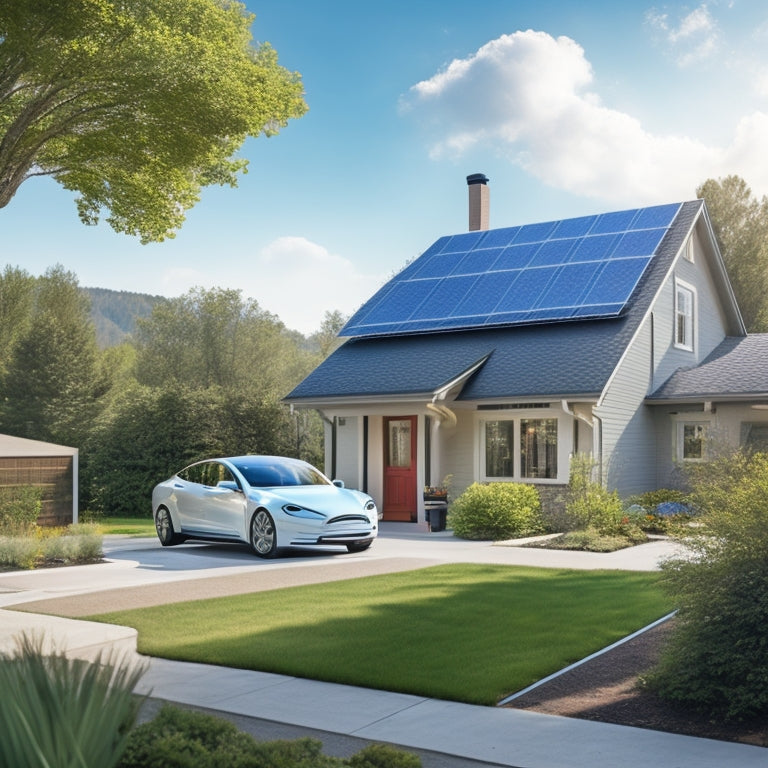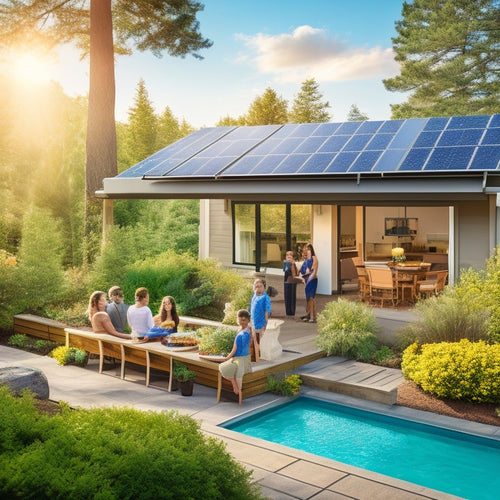
Why Homes Need Renewable Energy Systems
Share
You're taking a significant step towards reducing your reliance on fossil fuels and minimizing your carbon footprint by considering the integration of renewable energy systems into your home. Renewable energy addresses climate change, environmental degradation, and energy scarcity, while reducing your carbon footprint and promoting sustainable living practices. By incorporating green technologies like solar power, you'll enjoy lower electricity bills, effective energy management, and increased property value. As you investigate the benefits of renewable energy systems, you'll uncover how they can enhance your energy independence, reduce your reliance on the grid, and contribute to a cleaner environment - and that's just the beginning of your expedition towards a greener future.
Key Takeaways
- Homes need renewable energy systems to reduce their carbon footprint and contribute to a cleaner environment by minimizing greenhouse gas emissions.
- Renewable energy systems like solar power enable energy independence, reducing reliance on the grid and lower energy bills for homeowners.
- Incorporating green technologies like solar panels promotes sustainable living practices, essential for climate action and achieving energy independence.
- Renewable energy systems provide cost savings through reduced energy expenses, tax incentives, and increased property value.
- Adopting renewable energy systems is crucial for addressing climate change, environmental degradation, and energy scarcity, ensuring a sustainable future.
Renewable Energy for a Greener Future
As the world grapples with the challenges of climate change, environmental degradation, and energy scarcity, the pursuit of a greener future has become an imperative.
You're likely considering ways to reduce your environmental impact and shift to sustainable living. Adopting renewable energy sources is a vital step towards achieving this goal.
By incorporating eco-friendly practices and green technologies into your daily life, you can markedly reduce your reliance on fossil fuels and lower your carbon footprint.
Embracing alternative energy and clean resources is essential for climate action, and energy independence can be achieved through solar power systems, which provide clean energy and reduce carbon footprint.
In addition, solar power systems can also contribute to sustainability by reducing greenhouse gas emissions and promoting clean energy.
Solar Power for Home Appliances
Switch to solar power for your home appliances and you'll be plugging into a cleaner, more sustainable energy source.
With solar panels installed, you can capture the sun's energy to power your daily essentials like refrigerators, air conditioners, and laptops. This shift can greatly reduce your reliance on the grid and lower your electricity bills.
By choosing the right solar panels off-grid solar system design, you can guarantee a reliable source of power. Additionally, solar power systems can provide energy independence, especially in remote areas with limited traditional infrastructure.
-
Increased solar panel efficiency: Modern solar panels can convert up to 22% of sunlight into electricity, making them a reliable source of power.
-
Reduced energy consumption: Solar power helps you manage your home energy consumption more effectively, reducing waste and optimizing your energy usage.
-
Improved home energy management: With solar power, you can monitor and control your energy usage in real-time, making it easier to identify areas for improvement.
- Low maintenance costs: Solar panels require minimal maintenance and can last up to 30 years or more, guaranteeing a long-term return on your investment.
Reducing Carbon Footprint at Home
By embracing renewable energy systems, you're not only reducing your reliance on the grid but also taking an important step towards minimizing your carbon footprint at home.
This shift towards sustainable living is vital in today's era, where climate change is a pressing concern. By adopting eco-friendly practices, you can greatly reduce your household's greenhouse gas emissions.
For instance, off-grid solar battery systems can lead to reduced carbon footprint advantage and lower energy bills, making them a viable option.
Renewable energy systems, such as solar or wind power, can power your home appliances, reducing your dependence on fossil fuels. This, in turn, decreases the amount of carbon dioxide released into the atmosphere, contributing to a cleaner environment.
Energy Independence for Homes
You're taking a significant step towards reducing your carbon footprint by embracing renewable energy systems, and now you're ready to reap another major benefit: energy independence for your home.
By utilizing renewable energy sources like solar, wind, or geothermal, you'll reduce your reliance on the grid and improve your energy security. This means you'll be less affected by power outages, rate hikes, and supply disruptions.
Here are four key advantages of energy independence for your home:
-
Reduced reliance on the grid: You'll have a steady supply of clean energy, even when the grid fails.
-
Improved energy security: You'll be less vulnerable to price fluctuations and supply disruptions.
-
Enhanced sustainable living: You'll be living more sustainably, reducing your carbon footprint and contributing to a healthier environment.
- Increased property value: Energy independence can elevate your property's value and appeal to potential buyers.
Lowering Electric Bills With Solar
You can save money now by installing a solar energy system, which reduces your reliance on the grid and lowers your electric bills.
By utilizing free energy from the sun, you'll reduce energy waste and minimize your carbon footprint.
With solar power, you'll generate clean energy and enjoy significant savings on your utility bills.
Save Money Now
With the cost of traditional energy sources on the rise, homeowners are seeking ways to reduce their reliance on the grid and lower their electricity bills.
By integrating renewable energy systems, such as solar power, into your home, you can greatly reduce your energy expenses.
Here are 4 ways you can start saving money now:
-
Offset your energy consumption: Solar panels can generate electricity during the day, reducing your reliance on the grid and lowering your energy bills.
-
Optimize your energy usage: With smart home technology, you can monitor and control your energy consumption in real-time, making adjustments to optimize your energy usage.
-
Invest in energy efficient appliances: Upgrading to energy efficient appliances can reduce your overall energy consumption, further lowering your electricity bills.
- Take advantage of tax incentives: Many governments offer tax incentives for homeowners who invest in renewable energy systems, helping to offset the initial installation costs.
Reduce Energy Waste
By utilizing the power of solar energy, homeowners can greatly reduce energy waste and lower their electric bills.
You can achieve energy efficiency by converting sunlight into electricity, reducing your reliance on traditional fossil fuels. This, in turn, minimizes waste reduction, as you're not consuming unnecessary energy.
With solar panels, you can generate electricity during the day and store excess energy for later use. This approach guarantees that you're using the energy you need, when you need it, and reducing waste in the process.
Harness Free Energy
Solar panels convert sunlight directly into electrical energy, allowing homeowners to employ free energy and greatly lower their electric bills.
By installing solar panels, you can tap into the power of the sun to generate electricity, reducing your reliance on the grid and cutting your energy costs. This approach not only saves you money but also promotes energy efficiency and sustainable living.
Here are some benefits of accessing free energy with solar panels:
- Zero Energy Costs: Solar energy is free, reducing your electricity bills to zero.
- Increased Property Value: Installing solar panels can increase your property's value.
- Low Maintenance: Solar panels require minimal maintenance and last for decades.
- Environmental Benefits: Solar energy is a clean, renewable source of energy, reducing your carbon footprint.
Government Incentives for Solar Homes
You can greatly reduce the cost of installing a solar energy system in your home by taking advantage of government incentives.
Federal tax credits, for instance, allow you to claim a percentage of the total cost of your solar panel system as a credit on your taxes.
Additionally, many states offer rebate programs that provide further financial incentives for homeowners who invest in solar energy.
Federal Tax Credits
Since the implementation of the Energy Policy Act of 2005, homeowners have been able to take advantage of federal tax credits for renewable energy systems, considerably reducing the upfront cost of going solar.
You can claim a tax credit of 26% of the total cost of your solar panel system, including equipment and installation. This credit can be claimed on your federal income tax return, reducing your tax liability.
Here are the key benefits of federal tax credits for solar homeowners:
- 26% tax credit: Claim 26% of the total cost of your solar panel system.
- Reduced upfront cost: Lower your out-of-pocket expenses for going solar.
- Increased savings: Enjoy higher savings on your energy bills.
- Long-term benefits: Lock in long-term energy savings and reduce your carbon footprint.
State Rebate Programs
Many states offer rebate programs to encourage homeowners to invest in renewable energy systems, providing additional financial incentives beyond federal tax credits.
You can take advantage of these state incentives, which often provide funding options for homeowners who want to switch to renewable energy. To qualify, you'll need to meet the rebate eligibility criteria, which may include installing energy-efficient systems or participating in local initiatives.
You'll need to submit a program application, which typically involves providing documentation of your renewable energy system and its installation.
By participating in these programs, you'll not only enjoy financial benefits but also contribute to community engagement and homeowner education on energy efficiency.
Plus, these programs promote program sustainability, ensuring a greener future for your community.
Future of Renewable Energy Systems
As renewable energy systems gain traction, they're breaking free from their niche status and becoming a mainstream solution for homeowners.
You're likely wondering what the future holds for these sustainable innovations.
Here are four key areas that will shape the future of renewable energy systems:
-
Technological advancements: Improved efficiency and lower costs will make renewable energy systems more competitive with fossil fuels.
-
Grid modernization: Upgrades to the grid will enable seamless integration of renewable energy sources, ensuring reliable and efficient energy distribution.
-
Energy storage: Advancements in energy storage technologies will address intermittency concerns, allowing homeowners to store excess energy for later use.
- Policy structures: Governments will need to establish supportive policy structures to incentivize adoption and address integration challenges.
As these areas continue to evolve, you can expect to see widespread adoption of renewable energy systems, leading to a significant reduction in environmental impact and increased economic benefits.
Frequently Asked Questions
Can I Install Renewable Energy Systems in Apartments or Rented Homes?
You can install renewable energy systems in apartments or rented homes, but you'll face installation challenges, requiring coordination with your landlord or building management; consider energy efficiency upgrades, like solar-powered water heaters, that don't require extensive infrastructure changes.
How Do I Choose the Right Renewable Energy System for My Home?
Ha! You're finally ready to ditch fossil fuels, but now you're overwhelmed by options. Don't worry, you'll get it right! Assess your energy needs, research system types (solar, wind, geothermal), and consider factors like cost, space, and local incentives to find the perfect fit for your home.
Will Renewable Energy Systems Increase My Property Value?
You'll likely see an increase in property value as renewable energy systems enhance your home's energy efficiency, making it more attractive to potential buyers in a competitive property market.
Are Renewable Energy Systems Noisy or Visually Unappealing?
You'll find that modern renewable energy systems are designed with noise reduction in mind, using advanced materials and clever engineering to minimize sound output. Aesthetic design also prioritizes sleek, streamlined looks that blend seamlessly with your home's structure.
Can I Sell Excess Energy Generated Back to the Grid?
You can capitalize on your clean energy creation by selling excess power back to the grid through energy buyback programs, but you'll need to maneuver grid regulations and guarantee your system meets specific requirements to reap the rewards.
Related Posts
-

Smart Home Thermostats to Revolutionize Your Space
Smart home thermostats revolutionize your space by providing precise temperature control and optimizing energy saving...
-

Best Solar Powered Flashlights for Emergency Situations
When you're choosing the best solar-powered flashlights for emergency situations, focus on their brightness, battery ...
-

Top-Rated Home Solar Power Kits for Achieving Energy Independence
Top-rated home solar power kits enable you to achieve energy independence by greatly cutting your energy costs. You c...


